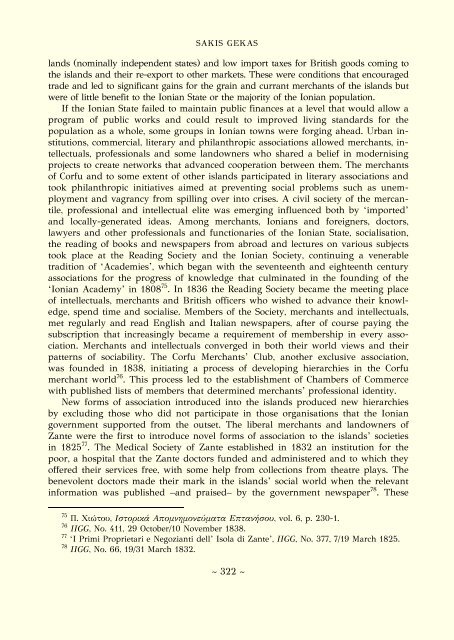Create successful ePaper yourself
Turn your PDF publications into a flip-book with our unique Google optimized e-Paper software.
SAKIS GEKAS<br />
lands (nominally independent states) and low import taxes for British goods coming to<br />
the islands and their re-export to other markets. These were conditions that encouraged<br />
trade and led to significant gains for the grain and currant merchants of the islands but<br />
were of little benefit to the Ionian State or the majority of the Ionian population.<br />
If the Ionian State failed to maintain public finances at a level that would allow a<br />
program of public works and could result to improved living standards for the<br />
population as a whole, some groups in Ionian towns were forging ahead. Urban institutions,<br />
commercial, literary and philanthropic associations allowed merchants, intellectuals,<br />
professionals and some landowners who shared a belief in modernising<br />
projects to create networks that advanced cooperation between them. The merchants<br />
of Corfu and to some extent of other islands participated in literary associations and<br />
took philanthropic initiatives aimed at preventing social problems such as unemployment<br />
and vagrancy from spilling over into crises. A civil society of the mercantile,<br />
professional and intellectual elite was emerging influenced both by ‘imported’<br />
and locally-generated ideas. Among merchants, Ionians and foreigners, doctors,<br />
lawyers and other professionals and functionaries of the Ionian State, socialisation,<br />
the reading of books and newspapers from abroad and lectures on various subjects<br />
took place at the Reading Society and the Ionian Society, continuing a venerable<br />
tradition of ‘Academies’, which began with the seventeenth and eighteenth century<br />
associations for the progress of knowledge that culminated in the founding of the<br />
‘Ionian Academy’ in 1808 75 . In 1836 the Reading Society became the meeting place<br />
of intellectuals, merchants and British officers who wished to advance their knowledge,<br />
spend time and socialise. Members of the Society, merchants and intellectuals,<br />
met regularly and read English and Italian newspapers, after of course paying the<br />
subscription that increasingly became a requirement of membership in every association.<br />
Merchants and intellectuals converged in both their world views and their<br />
patterns of sociability. The Corfu Merchants’ Club, another exclusive association,<br />
was founded in 1838, initiating a process of developing hierarchies in the Corfu<br />
merchant world 76 . This process led to the establishment of Chambers of Commerce<br />
with published lists of members that determined merchants’ professional identity.<br />
New forms of association introduced into the islands produced new hierarchies<br />
by excluding those who did not participate in those organisations that the Ionian<br />
government supported from the outset. The liberal merchants and landowners of<br />
Zante were the first to introduce novel forms of association to the islands’ societies<br />
in 1825 77 . The Medical Society of Zante established in 1832 an institution for the<br />
poor, a hospital that the Zante doctors funded and administered and to which they<br />
offered their services free, with some help from collections from theatre plays. The<br />
benevolent doctors made their mark in the islands’ social world when the relevant<br />
information was published –and praised– by the government newspaper 78 . These<br />
75 Π. Χιώτου, Ιστορικά Απομνημονεύματα Επτανήσου, vol. 6, p. 230-1.<br />
76 IIGG, Νο. 411, 29 October/10 November 1838.<br />
77 ‘I Primi Proprietari e Negozianti dell’ Isola di Zante’, IIGG, No. 377, 7/19 March 1825.<br />
78 IIGG, Νο. 66, 19/31 March 1832.<br />
~ 322 ~



